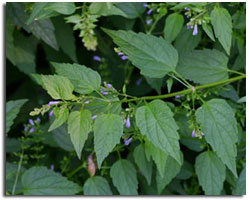
Skull Cap – Botanical Extract (4:1)
Botanical:
Scutellaria lateriflora
Family:
Labiatae/Lamiaceae (mint)
Other common names: Scullcap, Blue Pimpernel, Hood Wort, Mad Dog Weed, Helmet Flower, Side Flower, Madweed, Virginia Skullcap, Quaker Bonnet, American Scullcap
Too much anxiety and stress in your life? Try Skull Cap as a natural way to ease frayed nerves, relax, and get a restful sleep. It is an old remedy that helps to relieve “women’s complaints,” such as premenstrual syndrome and monthly cramps. Skull Cap is also considered very useful for alleviating the difficulties of barbiturate and drug withdrawal.
Disclaimer:
The information presented herein by Herbal Palace is intended for educational purposes only. These statements have not been evaluated by the FDA and are not intended to diagnose, cure, treat or prevent disease. Individual results may vary, and before using any supplements, it is always advisable to consult with your own health care provider.
History:
Skull Cap (also spelled Scullcap) is a small, herbaceous perennial, indigenous to North America, with an erect and branching square stem and flowers that may grow to a height of three feet. It is abundant throughout the land and thrives in damp places, meadows, ditches, and waste places from Canada to Florida. Different varieties of this herb grow throughout the world in temperate regions (most notably in China and Russia) with some similar medicinal applications as the “American Scullcap.” The name, Skull Cap, is derived from the helmet-shaped flower that resembles a helmet with the visor raised, and a “Skullcap” was the word for a type of military helmet that was familiar to early colonists. Native Americans wisely used this herb as a sedative and to promote menstruation. Skull Cap was believed to treat rabies in the 1700s, a use that was later discredited, but several of the herb’s common names (Mad Dog Weed and Madweed) remained to describe it. In the nineteenth century, Skull Cap was a popular medicinal treatment for nervous disorders and was used to subdue undue sexual desires without damage. Some of the constituents included in Skull Cap include essential oil, albumen, a bitter principle (scutellaine), flavonoids (scutellarein, isoscutellarein, wogonin, and baicalin), acids, beta carotene, lignin, tannins, chloride of soda, salts of iron, silica, many valuable minerals, B-vitamins, and vitamin C.
Beneficial Uses:
The time-honored use of Skull Cap has been as a nervine and tonic to renew and revive the central nervous system and treat nervous disorders of all kinds. The herb calms the nerves, quiets and strengthens the system, and is a valuable remedy for controlling nervous irritation, excitability, restlessness, hysteria, anxiety, hyperactivity, fatigue, night terrors, and nervous headaches. The flavonoid, scutellarein, is thought to be the active ingredient that acts as a natural sedative and also stimulates the brain to produce more endorphins, promoting a feeling of calm. Use of the herb has helped to aid sleep and treat insomnia.
As an antispasmodic, Skull Cap has been useful in relieving menstrual cramps, premenstrual syndrome, muscle spasms, and cramps due to stress. The herb is used to help treat St. Vitus dance, convulsions, and shaking palsy, and some modern herbalists use it to prevent epileptic seizures.
Skull Cap has been given to alcoholics who are suffering from withdrawal symptoms and delirium tremens. It is believed to be helpful in treating barbiturate, tranquilizer, and drug withdrawal symptoms.
The baicalin in Skull Cap has shown strong anti-inflammatory activity that may inhibit tumor growth. It is a powerful antioxidant that appears to protect red blood cells from free radical damage more effectively than vitamin E, and it also shows some promise in preventing the oxidation of blood fats.
Skull Cap is said to strengthen the heart muscle, improve circulation, and be helpful for treating cardiovascular disease.
Skull Cap has been used to treat snakebites and the bites of poisonous insects.
Contraindications:
Pregnant and nursing women should not use Skull Cap. Large doses (many times the recommended amount) may cause giddiness, confusion, twitching, and stupor, but the herb works well when taken consistently over a period of time. Skull Cap should not be given to children under six years of age.